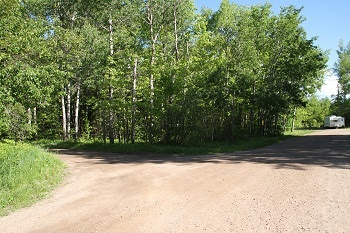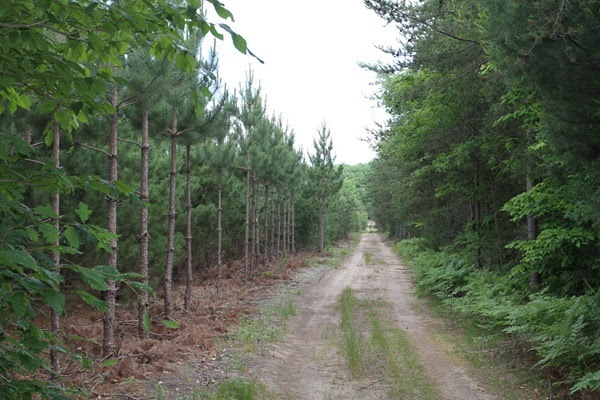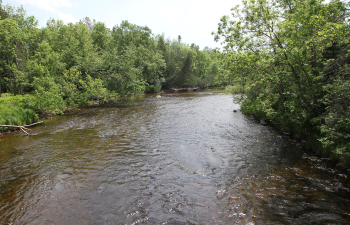Michigan: Nearly 100 Parcels of State-Managed Land in Online Auctions in August and September

Surplus land sales are a regular part of the DNR’s public land strategy
Lake frontage, trail access, small lots to extend a neighborhood lot – these types of acreage and more are available in the next round of surplus land auctions from the Michigan Department of Natural Resources. After careful consideration of properties it manages on behalf of Michigan residents, the DNR has selected 97 that are much better suited for private ownership and is preparing those for sale via online auctions in August and early September.
Get summer auction info ?
Land is available mainly in central/northern Lower Michigan and the Upper Peninsula in the following counties: Alcona, Allegan, Benzie, Berrien, Chippewa, Clare, Genesee, Huron, Kalkaska, Kent, Lake, Mackinac, Mason, Mecosta, Menominee, Midland, Newaygo, Roscommon and Saginaw. Several of the largest parcels are in Clare, Lake and Menominee counties.
Fourteen online auctions, featuring available land parcels by county, are scheduled:
-
- Aug. 2 – Benzie
- Aug. 3 – Chippewa and Mackinac
- Aug. 4 – Menominee
- Aug. 6 – Kalkaska and Roscommon
- Aug. 12 – Alcona
- Aug. 16 – Mason
- Aug. 17 – Clare, Lake and Newaygo
- Aug. 24 – Berrien
- Aug. 25 – Mecosta
- Aug. 26 – Allegan and Kent
- Aug. 27 – Midland
- Aug. 31 – Huron
- Sept. 2 – Saginaw
- Sept. 3 – Genesee
How bidding works
Fourteen online auctions will be offered between Aug. 2 and Sept. 3. Interested bidders may register in advance and get more information about the online auction schedule at Tax-Sale.info/. Those wanting to bid on a property must register before that property’s auction date. Absentee bids can be made online up to 30 days before the auction.
The “interactive” bidding portion of an auction will open at 10 a.m. on that auction date. At that time, bidders will be able to see current high bids for each property. Bidders can continue to place bids on a property until 7 p.m. when bidding closes and the winning bidder is determined.
Visit Michigan.gov/LandForSale for a detailed list that includes minimum bid, acreage and location information on the available properties. Interested bidders also are encouraged to review the DNR Land Sales: Terms and Conditions.
Land parcel details
Properties for sale range in size from under an acre to 120 acres. Many of the surplus properties highlighted in the auction are in Yates Township, Lake County. There are several larger 5- to 15-acre properties available in Yates Township.
In addition to these properties, two structures are being offered: an old DNR field administration equipment building in Caseville (Huron County) and the abandoned Big Rapids Railroad Depot in Mecosta County.
Notable waterfront properties that are accessible include:
- A Berrien County property with frontage on Lake Michigan.
- A Mason County parcel with frontage on Weldon Creek.
- A property in Mecosta County along the Little Muskegon River.
Many of the sale parcels are forested and/or have road frontage but are better suited for private ownership. Much of the land offered in these auctions is isolated from other DNR-managed property, which creates some challenges and inefficiencies. Other parcels are included in the auctions because they offer limited recreation benefits to the public.
Separate from the online auctions, the DNR is offering additional properties (listed for sale at their former minimum bid prices) that were not sold in previous auctions. These properties are available for view and immediate purchase only via the BuyNow list.
For more information about the sale of surplus, state-managed public land, contact Michael Michalek, resource specialist in the DNR’s Real Estate Section, at 517-331-8387. Auction proceeds will help provide future outdoor recreation opportunities in keeping with the DNR’s mission to conserve, protect and manage the state’s natural and cultural resources for the use and enjoyment of current and future generations.
DNR public land management
Public auctions are one way the DNR achieves the results of its routine review of public land ownership. To learn more about the strategies that are used to administer those lands, go to Michigan.gov/PublicLands. There you’ll also find the DNR’s recently completed public land strategy, which lays out the framework for best management of those lands over the next six years.
|





